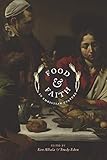Food and Faith in Christian Culture / ed. by Trudy Eden, Ken Albala.
Material type: TextSeries: Arts and Traditions of the Table: Perspectives on Culinary HistoryPublisher: New York, NY : Columbia University Press, [2011]Copyright date: ©2011Description: 1 online resource (280 p.)Content type:
TextSeries: Arts and Traditions of the Table: Perspectives on Culinary HistoryPublisher: New York, NY : Columbia University Press, [2011]Copyright date: ©2011Description: 1 online resource (280 p.)Content type: - 9780231149976
- 9780231520799
- 248.4
- BR115.N87 F655 2011
- online - DeGruyter
- Issued also in print.
| Item type | Current library | Call number | URL | Status | Notes | Barcode | |
|---|---|---|---|---|---|---|---|
 eBook
eBook
|
Biblioteca "Angelicum" Pont. Univ. S.Tommaso d'Aquino Nuvola online | online - DeGruyter (Browse shelf(Opens below)) | Online access | Not for loan (Accesso limitato) | Accesso per gli utenti autorizzati / Access for authorized users | (dgr)9780231520799 |
Frontmatter -- Contents -- Introduction -- Historical Background to Food and Christianity -- 1. The Urban Influence. Shopping and Consumption at the Florentine Monastery of Santa Trinità in the Mid-Fourteenth Century -- 2. The Ideology of Fasting in the Reformation Era -- 3. "The Food Police": Sumptuary Prohibitions on Food in the Reformation -- 4. Dirty Things: Bread, Maize, Women, and Christian Identity in Sixteenth-Century America -- 5. Enlightened Fasting: Religious Conviction, Scientific Inquiry, and Medical Knowledge in Early Modern France -- 6. The Sanctity of Bread: Missionaries and the Promotion of Wheat Growing Among the New Zealand Maori -- 7. Commensality and Love Feast: The Agape Meal in the Late Nineteenth- and Early Twentieth-Century Brethren in Christ Church -- 8. Metaphysics and Meatless Meals: Why Food Mattered When the Mind Was Everything -- 9. Fasting and Food Habits in the Eastern Orthodox Church -- 10. Divine Dieting: A Cultural Analysis of Christian Weight Loss Programs -- 11. Eating in Silence in an English Benedictine Monastery -- Bibliography -- Index
restricted access online access with authorization star
http://purl.org/coar/access_right/c_16ec
Without a uniform dietary code, Christians around the world used food in strikingly different ways, developing widely divergent practices that spread, nurtured, and strengthened their religious beliefs and communities. Featuring never-before published essays, this anthology follows the intersection of food and faith from the fourteenth to the twenty-first century, charting the complex relationship among religious eating habits and politics, culture, and social structure.Theoretically rich and full of engaging portraits, essays consider the rise of food buying and consumerism in the fourteenth century, the Reformation ideology of fasting and its resulting sanctions against sumptuous eating, the gender and racial politics of sacramental food production in colonial America, and the struggle to define "enlightened" Lenten dietary restrictions in early modern France. Essays on the nineteenth century explore the religious implications of wheat growing and breadmaking among New Zealand's Maori population and the revival of the Agape meal, or love feast, among American brethren in Christ Church. Twentieth-century topics include the metaphysical significance of vegetarianism, the function of diet in Greek Orthodoxy, American Christian weight loss programs, and the practice of silent eating rituals among English Benedictine monks. Two introductory essays detail the key themes tying these essays together and survey food's role in developing and disseminating the teachings of Christianity, not to mention providing a tangible experience of faith.
Issued also in print.
Mode of access: Internet via World Wide Web.
In English.
Description based on online resource; title from PDF title page (publisher's Web site, viewed 02. Mrz 2022)


